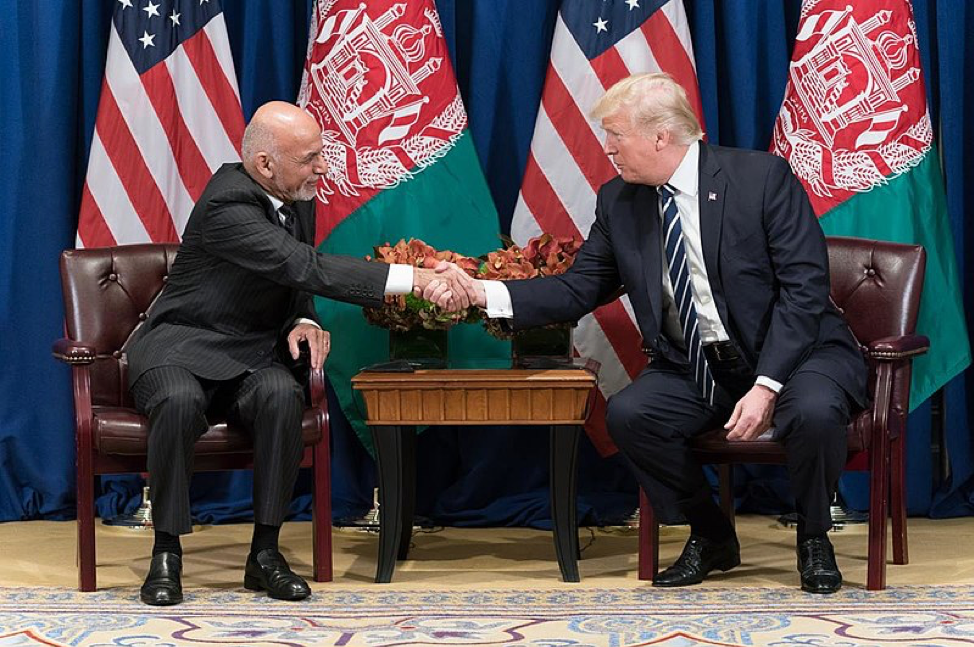The United States is entering the 19th year of its war in Afghanistan – America’s longest war to date. The United States invaded Afghanistan following the September 11 attacks, and the conflict has resulted in the deaths of over 3,500 troops from the US/NATO coalition, thousands of Afghan casualties, and a $900 billion price tag for the US taxpayer. Despite these costs, the Taliban still controls large swaths of Afghan territory, and the US-backed government is rife with corruption. As a result, many Americans now question the wisdom of keeping troops in the country for a seemingly fruitless mission. Recent peace talks between the Taliban and the US government have renewed hope that the US could withdraw its troops without worsening Afghanistan’s security situation. But, discussions about the peace talks overlook a key concern: the Trump administration’s political incentive to create a hasty peace in order to satisfy President Trump’s 2016 campaign promises.
Under the terms of this new agreement, the Taliban will agree to a seven-day ceasefire that, according to a senior Trump administration official, will start “very soon” and include “everything – roadside bombs, suicide bombs, [and] rocket attacks.” In exchange, the US has agreed to phase out its military presence in Afghanistan in stages if the Taliban continues to fulfill its end of the agreement and stops committing acts of violence. The Afghan government has also been involved in the peace talks, with Afghan President Ashraf Ghani and US Secretary of State Mike Pompeo meeting at the 2020 Munich Security Conference and reportedly reaching a mutual understanding that a successful ceasefire would lead to further negotiations that the Trump administration hopes will eventually lead to a total US withdrawal from Afghanistan. According to US Secretary of Defense Mark Esper, the administration’s initial goal is to reduce its presence of 12,000 troops in Afghanistan to 8,600 “over time.”
The news of a potential peace in Afghanistan has led to a sense of cautious optimism among many analysts, as it is always difficult to trust the credibility of the Taliban’s claims given its history of harboring terrorists. The public announcement of the US’s intentions for troop reduction is reminiscent of the Obama administration’s announcement of troop reduction in 2011, which was criticized for providing the Taliban with a timeline to wait out the US and continue its violent activities. This fear remains. President Ghani admitted at the Munich Conference that “it was impossible to know whether the Taliban might take advantage of a draw down in American military power in Afghanistan to reassert its own presence.”
The driving factor behind these negotiations occurring now, though, is likely Trump’s campaign promises to put “America First” and end many of America’s overseas involvements, particularly the Afghanistan War. A 2019 poll from the Pew Research Center found that 59% of Americans believed that the Afghanistan War was no longer worth fighting. Given his consistently lackluster approval ratings, President Trump needs a political win to boost his re-election chances. The appearance of a successful troop drawdown in Afghanistan would give him a tangible foreign policy victory to tout during his campaign. If Trump can argue that his administration begun the process of peacefully ending America’s longest war, he will enter the general election with the message of a key campaign promise fulfilled.
But the promise of lasting peace in Afghanistan is not likely to be fulfilled. Trump’s political incentive to achieve this goal ends on Election Day. Whether he wins re-election or not, he will have no more campaigns to run, and his incentive to project an image of strategic prowess toward Afghanistan will be greatly diminished. Therefore, any analysis of the peace talks must keep in mind that political actors always consider their domestic political objectives when crafting foreign policies. The timing of these peace talks with the upcoming US presidential election should cause observers to view them with a healthy dose of skepticism, and in the coming months, analysts should view the success or failure of these negotiations with an eye on President Trump’s re-election strategy.
Tim Bynion is a PhD student in Political Science at George Mason University’s Schar School of Policy and Government, majoring in American Government and International Relations. He holds a B.S. in Political Science from Towson University. His research interests include the domestic sources of American foreign policy, specifically issues of public opinion and national identity.
Photo can be found here.




